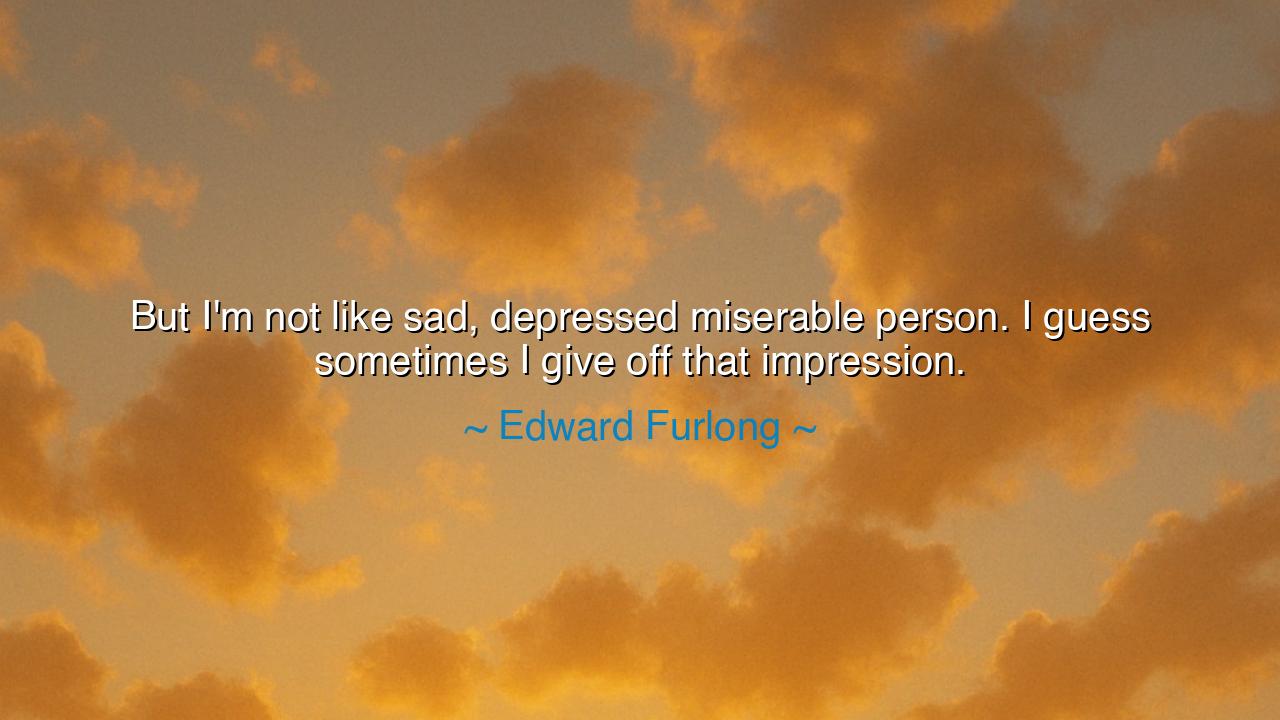
But I'm not like sad, depressed miserable person. I guess
But I'm not like sad, depressed miserable person. I guess sometimes I give off that impression.






Hear the words of Edward Furlong, spoken with honesty and weariness: “But I’m not like sad, depressed, miserable person. I guess sometimes I give off that impression.” These words reveal a truth older than kingdoms—that what the world sees upon a face is not always the truth within the heart. Many live with masks, some chosen, some thrust upon them, and too often the world mistakes the shadow for the whole.
To be seen as sad when the spirit is not broken is a burden in itself. For perception can become a prison, binding a man in the eyes of others more tightly than chains. A furrowed brow, a quiet manner, a brooding silence—these may be taken as signs of misery, when in truth they are but surface ripples of deeper waters. Furlong’s confession shows us the eternal struggle between appearance and essence, between what others think we are and what we know ourselves to be.
The ancients knew well this tension. Consider the tale of King Solomon, who was said to be the wisest of men. His meditations often carried the tone of lament, and so many thought him steeped in despair. Yet within his writings lies not misery, but profound reflection—a recognition that life is both fleeting and beautiful, bitter and sweet. His solemn words gave off the impression of sorrow, but in truth they were wisdom clothed in solemnity. So too with many souls: the outward sign deceives, while the inner fire burns quietly, steadfast.
History offers us further proof. Abraham Lincoln, in his long, gaunt figure and solemn face, was often thought to be weighed down by ceaseless depression. And though he did wrestle with sorrow, his heart carried not only grief but also fierce resolve, humor, and compassion. His visage gave the world one picture, but his deeds revealed another: the man who guided a nation through war, who found laughter in the darkest hours, who bore the sadness of many but was never wholly defined by it.
Furlong’s words remind us that identity is not dictated by others’ impressions, but by the truth we carry within. To accept false labels—“sad,” “miserable,” “depressed”—is to let others name us. But to speak as he did is an act of reclamation: to say, “That is not who I am, though I may seem so.” In this courage lies the power to break illusions and affirm the fullness of the self.
The lesson is clear: do not judge a person solely by what they appear to be. Behind the quiet eyes may dwell joy, behind the stern face may live kindness, behind the weary demeanor may pulse strength. And when you yourself are misjudged, remember that others see only fragments. Do not let their fragments define your wholeness. Instead, declare who you are, not with anger but with truth.
Therefore, let all who hear take this counsel: when you encounter one who seems sad or distant, look deeper. Ask, listen, be patient. For often, what you perceive is but the surface of a soul more vast than you know. And when you yourself feel misunderstood, do not despair. For the truth of who you are does not rest in the eyes of others, but in the quiet certainty within your own spirit.
Thus, the teaching endures: the impression others carry may be shadow, but the essence of a person is light. Do not be deceived by appearances, nor crushed by misjudgment. Instead, live in the strength of your truth, and let your deeds—not others’ illusions—reveal the fullness of who you are.






AAdministratorAdministrator
Welcome, honored guests. Please leave a comment, we will respond soon